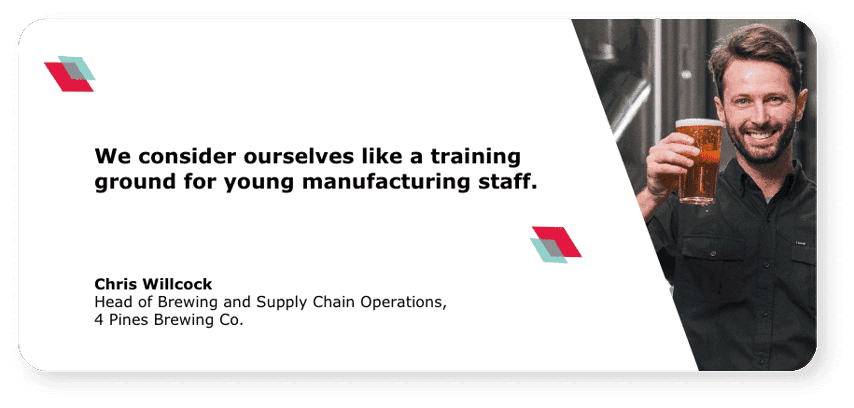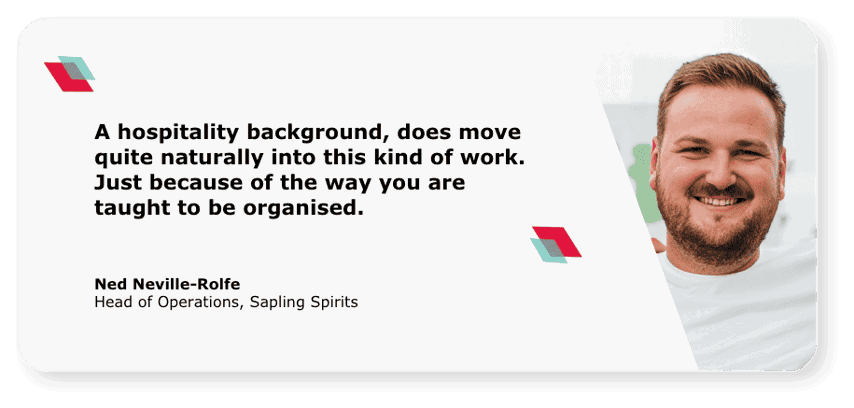
While technology has been a focus in supply chain management for many years, in the end successful supply chains depended on people. In this eighth Unleashed Supply Chain Management Roundtable we speak to a collection of experts and industry professionals on their approach to the challenges of staffing and skills management.
Meet the experts
- Sergio Da Silva, Supply Chain Analyst, Flava Dot Global
- Phil Peters, Head of Supply Chain Services at YF
- Ned Neville-Rolfe, Head of Operations, Sapling Spirits
- Chris Willcock, Head of Brewing and Supply Chain Operations, 4 Pines Brewing Co.
How do you find the right people?
Sustainability credentials are very important to young people, says Ned Neville-Rolfe, and as a certified B Corp this is an important part of their offering as an employer – as is offering space in which to grow.
Just being a small team means that you do just pick up responsibilities that maybe weren't there in the job ad. And we encourage [that]. We're like, listen, own it. We're here to support you – if it's too much, let us know. But also, we appreciate that these jobs are here to make your own.
“And then also as a team, we kind of all challenge ourselves to make sure our sectors are as innovative as possible.”
Phil Peters points out that realistic pay is also a challenge to be met. “I think there's the immediate challenge, which is, are companies paying the right amount to attract the right talent? But I think that the mission and purpose side is [also] really key and really important. And we found it by getting our B Corp status last year.”

Meanwhile Sergio Da Silva points out that universities are an excellent recruiting ground for up-and- coming talent.
“We have a connection with one of the main lecturers here at the University of Pretoria. It's always a bit tricky to take a chance on someone, build them up, teach them what they need to know. But then usually it creates a sense of loyalty as well. And it’s great to develop these youngsters.”
Is training a ‘magnanimous gesture’?
Investing in staff can also be risky, given the mobility of the workforce. We asked our supply chain experts how they approached the issue.
“We consider ourselves a training ground for young manufacturing staff,” says Chris Wilcox.
“So we hire and develop skills in our team hoping and expecting that we can progress them quickly through various levels of training promoting them and giving them career opportunities on the way." 
“I have the mindset, if we have a person for five good years, they leave on good terms and they go to another industry, another brewery a different job with good skills that they've taken from us and appreciative of the time they've had, then that's a successful partnership with that person.”
“So despite our investment being theoretically lost it, I still think we get more value than we put in when we sort of net it all out. Not to mention we get great references for new staff and we have a good reputation as an employer.”
But is there an ideal return on investment, in terms of years of employment?
“It's hard to put a figure or a number on that,” says Phil. "But we do know that retaining staff is always going to be a cheaper option than hiring, but also a more valuable option to the business. You know, the longer somebody stays with you, of course the better."
What’s the right personality type for a role in supply chain management?
“I was chatting to someone about this earlier,” says Ned Neville-Rolfe
“In manufacturing supply chain, I think you don't want people to be, it sounds a bit mean but maybe not too creative. Like for me personally you want it to be process driven and you want everyone to follow a way of doing things. So the kind of people I work with are intelligent and organised people.”
“And it doesn't necessarily tie down to education. It's more of a kind of a natural thing to be picked up.”

Hiring for attitude is more important than qualifications, adds Phil:
“Some manufacturing lines are more complicated than others, of course. But most of what we do can be taught to people that want to learn and want to come and build a career in a really exciting industry. So, yeah, I think everyone would probably say similarly that [it’s best] to hire for attitude; find somebody that fits the culture of the business.”
How do you attract and retain millennials for supply chain roles?
A risk of supply chain work is that younger people can feel like the need for consistency and process stifles them, says Chris.
"You're running a process, you're trying to do it as consistently as possible, as efficiently as possible. Yet millennials bring new skills and familiarity with the tech space. So, allowing a bit of creativity and for them to express themselves beyond just the output of their day-to-day job – and rewarding that too – can be a real way to help retain skills.”

“For example some of our junior staff on the packaging line created a QR code that they stick on to every machine on our packaging line, which is about seven or eight machines.
“Now if there's an issue with that machine and, and they can't fix it, they scan the QR code and enter the issue into their phones, and that goes to our maintenance team into a nice, concise spreadsheet, which is integrated with our maintenance systems.
“I wouldn't have even thought of that idea – that was something that was just riffed on by the packaging team themselves. And obviously they don't do that for extra money, but if they continue to do that and you're not recognising that in their performance reviews and allowing them acceleration through promotions, etc, then long term, it'll be hard to retain them.”
